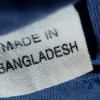Powered by apparel, exports rise 21% in Oct

The country's merchandise exports grew by 21 percent year-on-year to $4.13 billion in October, mainly riding on increased garment shipments, according to data released by the Export Promotion Bureau (EPB) yesterday.
With this, the country's overall merchandise exports in the first four months of the 2024-25 fiscal year climbed 10.80 percent year-on-year to $15.78 billion.
During the July-October period, garment exports, which account for over 84 percent of Bangladesh's total export earnings, grew by 22.80 percent to $12.81 billion.
For the July-October growth, local apparel manufacturers credited a prompt recovery from shipment challenges faced in previous months due to nationwide student protests.
They say these disruptions hampered production, cargo transportation and port activities in Chattogram, and affected timely shipments.
Anwar-Ul-Alam Chowdhury (Parvez), former president of the Bangladesh Garment Manufacturers and Exporters Association (BGMEA), said that while garment shipments are improving, many factories are still not getting enough work orders for the upcoming season.
In the July-September period, he said the apparel shipment from Bangladesh to the USA, the single largest garment export destination, declined by more than 6.0 percent.
This decline coincides with a more than 2 percent decrease in overall US garment imports.
Parvez said the higher volume of garment shipments usually occurs in July, August and September to cater to Christmas sales. This period also witnessed increased payments from international retailers and brands.
During this period, knitwear exports increased by 12.08 percent to $7.20 billion, while woven exports grew by 10.48 percent to $5.60 billion, according to EPB data. Frozen food exports rose by 10.59 percent to $153.18 million.
Leather and leather goods exports jumped 9.82 percent to $372.24 million and non-leather footwear exports increased by 36.04 percent to $167.11 million.
However, jute and jute goods exports declined by 13.70 percent to $264.81 million.
Home textile exports are gradually recovering from a negative trend as local exporters get increased work orders from international retailers and brands.
During July-October, home textile shipments grew by 1.31 percent to $254.94 million.
Exports of jute and jute goods have been declining over the past few years mostly because of the anti-dumping duties imposed on the shipments to India, the single largest export destination for Bangladeshi jute and jute goods.
Russia is another major export destination for Bangladeshi jute and jute goods, but exports to the country have been affected due to the Russia -Ukraine war.

 For all latest news, follow The Daily Star's Google News channel.
For all latest news, follow The Daily Star's Google News channel. 








Comments